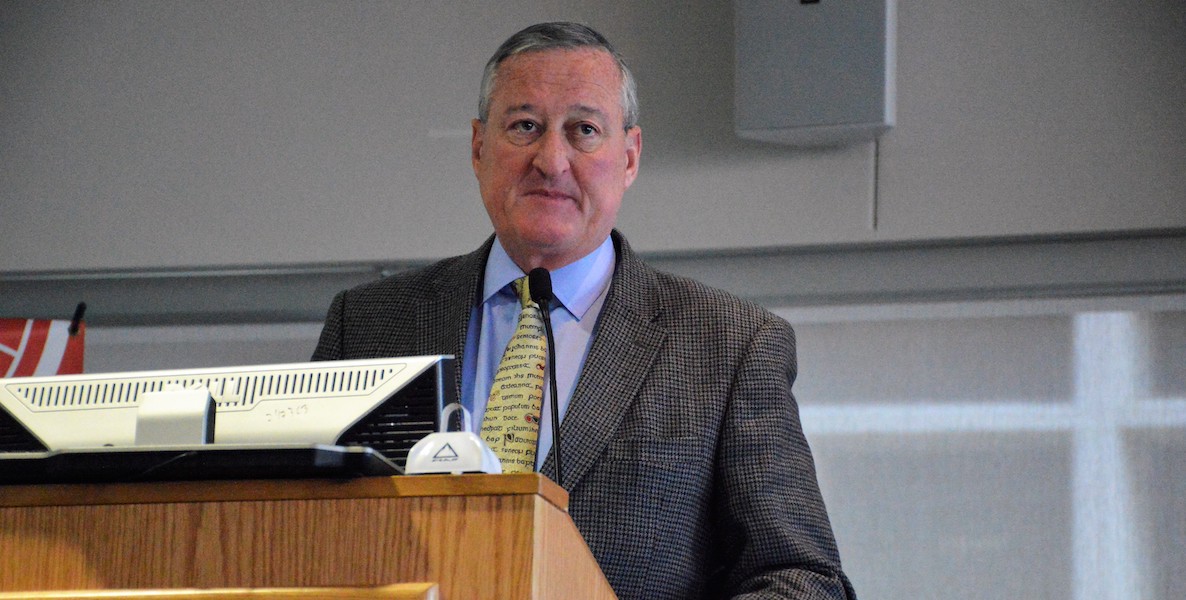Think about how unsettling the past couple weeks have been. Now picture living through that as, say, a single mother in a rental apartment, and you just lost your job.
Huge numbers of Philadelphians are waking up to a new reality where their best chance of surviving and avoiding crippling poverty is by enrolling in government programs known by obscure acronyms that have no relation to their actual purpose: SNAP, WIC, LIHEAP, TANF. A reliable roadmap can be hard to find.
Read this short version of this storyShort on time?
Amid the alphabet soup of welfare programs, there is one local nonprofit that serves as a gateway, linking people up with the benefits they are entitled to receive. Its name sounds about as gray and opaque as the federal agencies it negotiates so skillfully, but Benefits Data Trust, or BDT, also knows how to communicate with people desperately in need of food, health care, and housing.
The Philadelphia nonprofit offers friendly advice about which welfare programs they are eligible for and how to apply.
“Every call is someone who is in some fairly tough circumstances and needs to get help,” says Trooper Sanders, CEO of BDT. Conversations with BDT should be as customer-friendly and seamless as wealthy people have come to expect from their interactions with banks and other institutions, Sanders says. BDT is funded through philanthropy, grants and government contracts, but the callers in need of services pay nothing.
After a call to BDT, that hypothetical single mother who lost her job could learn whether she qualified for programs like SNAP or WIC, which pay for groceries, LIHEAP, which pays for utilities, or TANF, which offers cash to those in need. The protocols for actually enrolling in the programs vary, and BDT helps out where it can with that as well.
Unsurprisingly, the BDT call volume has rocketed up since the economy cratered. In a recent week, the call volume was 79 percent higher than in the weeks that preceded the pandemic, according to Sanders.
Be Part of the Solution
Become a Citizen member.Meanwhile, because of the coronavirus risks, all BDT staff are working from home, but that has hardly hampered their productivity, according to Sanders.
“We have barely missed a beat and we are working remotely,” Sanders says.
Given the mounting unemployment, lost wages and unpaid bills on the horizon, the challenges for BDT are immense, but Sanders and others believe that by connecting people to the assistance they are entitled to receive, they can help not just the recipients themselves, but the local economy as a whole.
“Now more than ever we need companies like BDT to get the word out and to get the immediate funds to the individuals in the city,” says Councilmember Allan Domb. “That money is going to become essential and crucial for people to basically survive this economic situation.”
Quiñones-Sánchez, whose council district includes some poverty-stricken areas of Kensington, says the people most at risk—who could also benefit most by getting in touch with BDT—are those who just lost their incomes who might not know where to turn.
“People who live in deep poverty are more resilient. I’m worried about people who are not used to struggling,” Sánchez says.
“BDT keeps it super simple. Sometimes the bureaucracies overthink this stuff,” Councilwoman Quinones-Sánchez says. “They are not the no people. They are like, ‘Let’s figure out the how.’”
BDT estimates that $60 billion in government benefits go unclaimed every year, and in Philadelphia more than $450 million in benefits from five big programs sits unspent. That includes more than $230 million in Medicaid benefits, which could be particularly crucial now when practically everyone is at great risk of catching a debilitating and potentially deadly disease.
More than $100 million has been left unspent for the Earned Income Tax Credit that gives low-wage earners cash, and more than $100 million in Supplemental Nutritional Assistance Program benefits has not gone out to the 67,000 Philadelphians who qualify for it.
A total of more than $27 million in state benefit programs designed to help older people pay for prescriptions, and help folks pay rent and real estate taxes has also sat untapped.
“It’s already there,” Domb says. “All we’ve got to do is tap into it.”
BDT is helping enroll people into those state and federal aid programs one phone call at a time, and Domb wants to send the nonprofit more city money to help in that work.
Mayor Jim Kenney signed an $85.4 million spending bill to help the city fund the response to the unfolding catastrophe. Domb requested that the mayor put at least $150,000 towards BDT to connect Philadelphians with aid programs, and he thinks the program deserves more than that. BDT receives $1.4 million in federal community service block grant funding from the city, according to the nonprofit.
Quiñones-Sánchez says the city should use BDT to link people up with even more programs, and she said the nonprofit is so good at what it does because of the organization’s can-do ethos and its independence from the structure of government.
“I think that they keep it really super simple. Sometimes the bureaucracies overthink this stuff,” Quiñones-Sánchez says. “They are not the no people. They are like, ‘Let’s figure out the how.’”
Get help if you need itDo Something
“BDT is probably the model that should be utilized across the United States. And we are so fortunate to have it in Philadelphia,” he says.
While it is based in Philly, BDT operates elsewhere, too, and there is sure to be a mountain of work connecting people to government benefits. In the 20 days since March 15, more than 1.2 million Pennsylvanians have filed for unemployment benefits. BDT does not handle unemployment claims, but the people who lose their jobs often need extra help.
Meanwhile, Congress passed an unprecedented $2.2 trillion economic rescue package, and more federal assistance may be on the way.
 “We are actively in the muck of understanding what the technical implications are of the new law,” Sanders says.
“We are actively in the muck of understanding what the technical implications are of the new law,” Sanders says.
One of the biggest pieces of the federal aid bill is the $1,200-per-tax-filer “recovery rebates” the federal government is sending out. That direct cash aid is not as simple as it might sound, however.
Those who have neither earned taxable income nor enrolled in social security benefits will have additional complications accessing their payment, according to Sanders.
“There’s a gap that the government is trying to figure out: How do they get the money to those people?” Sanders says. Sanders hopes that BDT can help with that, but he doesn’t want to promise anything yet.
One of the key roles that BDT plays is by alerting people when they do not qualify for certain benefits. That improves efficiency and saves the time of both those in need and the government officials who administer the program.
BDT estimates that $60 billion in government benefits go unclaimed every year, and in Philadelphia more than $450 million in benefits from five big programs sits unclaimed. “It’s already there,” Councilman Domb says. “All we’ve got to do is tap into it.”
BDT is looking for other efficiencies, too. Sanders, who joined BDT as CEO in September, has a background in both social service and technology, and BDT has already incorporated some computer analytics to help BDT staff assist callers.
Artificial intelligence could be a good fit for the task of navigating the Byzantine rules governing welfare programs, but Sanders says the human element will remain paramount. On the current system, staff can override the computer program’s suggestions, according to Sanders.
Broke in Philly storiesRead More
“In the best circumstance, it should enable more human interaction and a better client experience if you recognize that the technology is one tool in the broader scheme of things,” Sanders says.
In 2018, BDT was awarded a $1 million grant from the Chan Zuckerberg Initiative and the Rockefeller Foundation—where Sanders was a fellow—to enhance BDT’s use of technology.
But when Sanders looks into the future now, he doesn’t just see technological innovation. The imperative to protect the public from the deadly coronavirus required a response to essentially shut down all but the most essential businesses in Philadelphia and in most of the country. That should save lives, but it has brought a hammer down on people’s finances, which will have lasting implications.
“This is going to be with us for a while,” Sanders says. “Getting our public benefits programs right, and making sure that everyone who is eligible for benefits receives them, is the most concrete and scalable thing we can do to help ease some of the pain of this economic emergency.”
Photo courtesy Allef Vinicius / Unsplash







